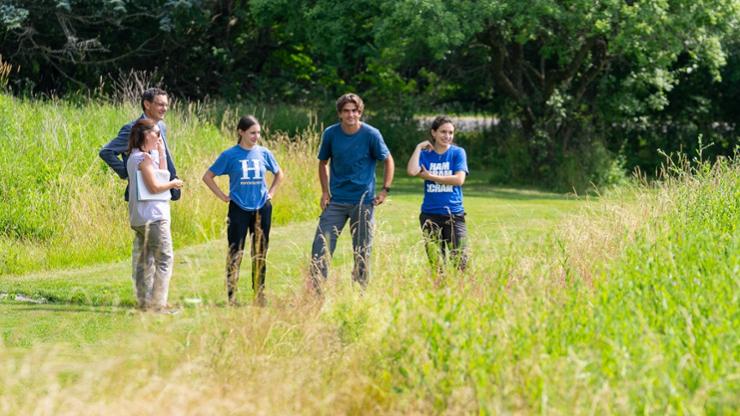Austin Cipriano ’25, Shey Sanges ’26, and Marcela Rondon ’27 spent their summer making a tangible impact on Hamilton College’s campus sustainability efforts. Under the guidance of Director of Environmental Protection Safety and Sustainability Brian Hansen, these students worked on three critical projects aimed at helping Hamilton achieve carbon neutrality by 2030.
The students’ primary focus was on developing a waste management action plan to assist Hamilton in diverting 90% of its waste from landfills by 2030. Through extensive research and collaboration with sustainability experts from other colleges, they formulated a comprehensive action proposal divided into four sections with key takeaways and recommendations for future steps.
Cipriano emphasized the importance of forming a waste management working group consisting of faculty, staff, students, and other stakeholders to facilitate the implementation of their proposal. This collaborative approach would ensure cross-campus coordination and effective execution of sustainability initiatives.
In addition to the waste management plan, the students identified the need for a waste audit to accurately measure Hamilton’s waste generation. Rondon highlighted the significance of obtaining precise data to establish clear goals and strategies for addressing specific waste management challenges, such as food waste hauling and securing sustainability grants.
Despite the ongoing refinement of their plan, the students acknowledged the complexity of sustainability efforts and the collective commitment required to make a meaningful impact. Cipriano noted that sustainability initiatives involve multiple concurrent activities, with everyone striving to maximize their contributions towards a more sustainable future.
Apart from the waste management project, the group also worked on securing funding through two essential grants. Sanges, who oversees the Harvest Initiative, explained how one grant aims to replace disposable containers with reusable ones, while the other grant with Siemens is intended to support the waste audit process.
While much of their work involved research and administrative tasks, the students actively participated in on-campus activities, such as maintenance work near Rogers Glen and tree tagging initiatives. These hands-on experiences allowed them to witness the practical aspects of sustainability efforts and contribute directly to Hamilton’s environmental conservation endeavors.
Reflecting on their summer internship, the students expressed personal and professional growth, with Sanges highlighting the importance of understanding the collaborative efforts required to drive meaningful change. Meeting with President Tepper and engaging with sustainability leaders further solidified their career aspirations in higher education and sustainability fields.
As they prepare to continue their work with Hansen and the sustainability office in the upcoming year, the interns are eager to see their waste management proposal come to fruition. Rondon, who is pursuing additional research with the Environmental Studies Department, emphasized the impact of their work and the legacy they hope to leave behind in Hamilton’s sustainability journey.
Overall, Austin Cipriano, Shey Sanges, and Marcela Rondon’s dedication and contributions to Hamilton College’s sustainability initiatives exemplify the commitment of students towards creating a more environmentally conscious campus community. Their collaborative efforts and innovative solutions are instrumental in advancing Hamilton’s goal of achieving carbon neutrality by 2030.

